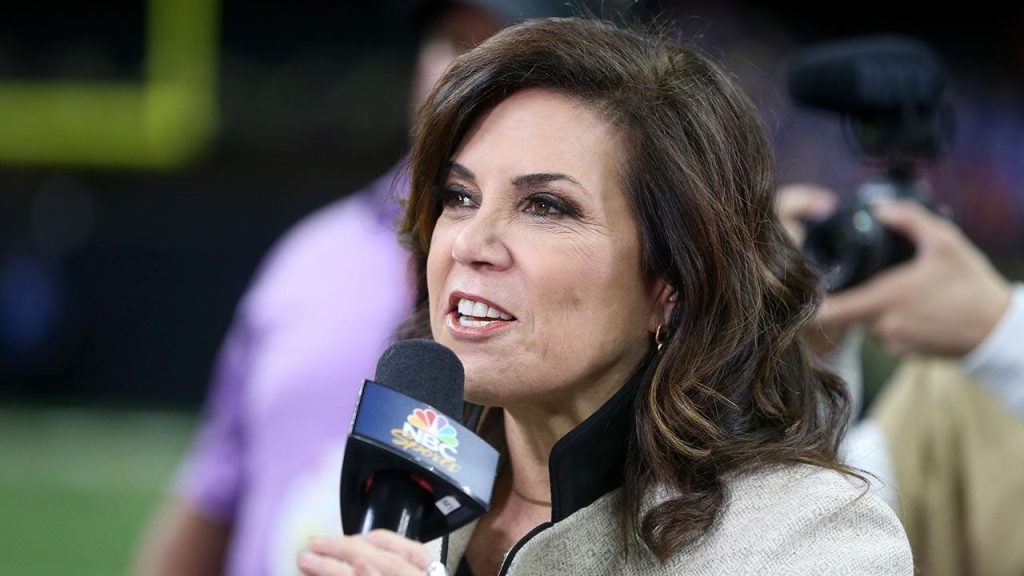Mark Zuckerberg’s decision to dismantle Facebook’s third-party fact-checking program has ignited a firestorm of debate, with critics like former NFL reporter Michele Tafoya denouncing the move as a blatant disregard for truth and accountability. The program, established in the wake of the 2016 election, aimed to combat misinformation and manage content on the platform, but Zuckerberg’s recent announcement signifies a dramatic shift towards a community-driven approach, mirroring the model employed by X (formerly Twitter). This decision has raised concerns about the potential for unchecked misinformation to proliferate, particularly given the platform’s vast reach and influence.
Tafoya’s vehement critique highlights the growing apprehension surrounding the abandonment of professional fact-checking. She argues that Zuckerberg’s reversal is a tacit admission of wrongdoing, an attempt to rectify a flawed system under the guise of promoting free expression. Tafoya’s comparison to the suppression of dissenting voices under Justin Trudeau’s administration in Canada underscores her concern that this move could embolden a culture of silencing alternative viewpoints and stifle open dialogue. The removal of the fact-checking program, she contends, represents a dangerous erosion of safeguards against misinformation and a potential threat to the very foundations of free speech.
Zuckerberg’s rationale for the change, as conveyed through Meta’s chief global affairs officer Joel Kaplan, emphasizes the purported limitations of relying on “so-called experts” with inherent biases. The new system, based on community notes, aims to empower users to contribute their own perspectives and assessments of content. Kaplan argues that this approach promotes a more democratic and transparent evaluation process, where the collective wisdom of the community dictates the veracity of information. This shift, however, raises critical questions about the potential for manipulation, the amplification of existing biases within user communities, and the capacity of a decentralized system to effectively counter sophisticated disinformation campaigns.
The central tension in this debate revolves around the balance between free speech and the responsibility to mitigate the spread of harmful misinformation. Critics of the fact-checking program argue that it imposed undue restrictions on free expression, potentially silencing legitimate dissenting voices and exhibiting a bias towards certain political viewpoints. Proponents, on the other hand, contend that the program served as a crucial defense against the proliferation of false and misleading information, particularly in the context of politically charged topics and public health crises.
The transition to community notes introduces a novel approach to content moderation, placing the onus of evaluation on the user base itself. This model, however, is fraught with challenges. The effectiveness of community notes hinges on the assumption that a diverse and representative cross-section of users will engage in the process, providing balanced and informed perspectives. The potential for manipulation by coordinated groups, the amplification of pre-existing biases within communities, and the difficulty of achieving consensus on complex and contentious issues pose significant hurdles to the success of this approach.
Furthermore, the removal of professional fact-checkers raises concerns about the capacity of the platform to effectively combat sophisticated disinformation campaigns. Professional fact-checkers possess the training, resources, and expertise to investigate claims, analyze evidence, and debunk false narratives. Their absence leaves a void that may be difficult to fill by a decentralized system reliant on the voluntary contributions of users. The potential for misinformation to spread unchecked, especially in the absence of a robust and reliable verification mechanism, presents a significant threat to public discourse and informed decision-making.
The debate surrounding Facebook’s decision underscores the complex and evolving relationship between social media platforms and the information ecosystem. As these platforms become increasingly influential in shaping public opinion and disseminating information, the need for effective mechanisms to combat misinformation becomes ever more critical. The effectiveness of community notes as a replacement for professional fact-checking remains to be seen. The potential for manipulation, bias, and the lack of expert oversight raise serious concerns about the platform’s ability to effectively counter the spread of false and misleading information.
Zuckerberg’s decision to prioritize community input over expert analysis represents a significant gamble. The success of this approach hinges on the active participation of a diverse and informed user base, as well as the development of robust mechanisms to prevent manipulation and ensure the accuracy and reliability of community-generated notes. The long-term consequences of this decision for the integrity of information on the platform, and the broader implications for public discourse and democratic processes, remain to be seen. The transition to community notes represents a significant experiment in content moderation, one that will be closely watched by experts, policymakers, and users alike. Its ultimate success or failure will have profound implications for the future of online information and the fight against misinformation.

